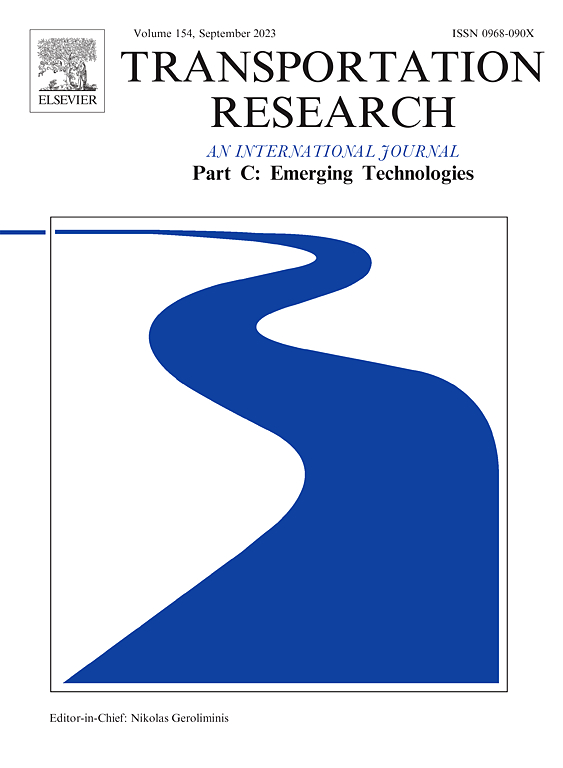A hierarchical-centralized MPC strategy for connected automated vehicular platoon incorporating level interactions
IF 7.6
1区 工程技术
Q1 TRANSPORTATION SCIENCE & TECHNOLOGY
Transportation Research Part C-Emerging Technologies
Pub Date : 2024-11-10
DOI:10.1016/j.trc.2024.104911
引用次数: 0
Abstract
Recently, there has been a surge of interest in developing platoon control strategies based on model predictive control (MPC) to enhance cooperation among connected automated vehicles (CAVs). Nevertheless, solving the optimization problem in MPC instantaneously while achieving centralized coordination among all vehicles proves to be challenging. To address this problem, this study proposes a hierarchical-centralized MPC (HCMPC) strategy for CAVs in a platoon, where a two-level information interaction and control decision generation procedure is developed. In this strategy, interactions among CAVs are divided into two levels by decoupling the platoon into sub-platoons. The upper level denotes the interaction between the leading vehicle of the whole platoon and sub-leading vehicles. The lower level denotes the interaction between the sub-leading vehicle and following vehicles in the same sub-platoon. Corresponding to the two levels, the platoon controller and sub-platoon controllers are interacted to realize cooperative behaviour while reducing computational time. A thorough stability analysis including asymptotic stability and string stability is conducted, obtaining sufficient conditions for different levels of string stability of this novel hierarchical control structure. The results of both numerical and field experiments show that HCMPC reduces the computational time significantly while achieving similar performance to idealized MPC in terms of realizing control target and suppressing traffic oscillations.
包含水平交互的互联自动车辆排的分层集中式 MPC 战略
最近,人们对开发基于模型预测控制(MPC)的排队控制策略以加强联网自动驾驶车辆(CAV)之间的合作兴趣大增。然而,在实现所有车辆集中协调的同时即时解决 MPC 中的优化问题证明是一项挑战。为解决这一问题,本研究提出了一种针对排中 CAV 的分层集中 MPC(HCMPC)策略,其中开发了一个两级信息交互和控制决策生成程序。在该策略中,通过将排解耦为子排,将 CAV 之间的交互分为两个层次。上层表示整个排的领头车辆与子领头车辆之间的交互。下层表示同一分排中副领队车辆与后续车辆之间的交互。与这两个层次相对应,排控制器和子排控制器相互作用,以实现协同行为,同时减少计算时间。对包括渐近稳定性和串稳定性在内的稳定性进行了全面分析,为这种新型分层控制结构的不同级别串稳定性获得了充分条件。数值和现场实验结果表明,HCMPC 大幅减少了计算时间,同时在实现控制目标和抑制交通振荡方面取得了与理想化 MPC 相似的性能。
本文章由计算机程序翻译,如有差异,请以英文原文为准。
求助全文
约1分钟内获得全文
求助全文
来源期刊
CiteScore
15.80
自引率
12.00%
发文量
332
审稿时长
64 days
期刊介绍:
Transportation Research: Part C (TR_C) is dedicated to showcasing high-quality, scholarly research that delves into the development, applications, and implications of transportation systems and emerging technologies. Our focus lies not solely on individual technologies, but rather on their broader implications for the planning, design, operation, control, maintenance, and rehabilitation of transportation systems, services, and components. In essence, the intellectual core of the journal revolves around the transportation aspect rather than the technology itself. We actively encourage the integration of quantitative methods from diverse fields such as operations research, control systems, complex networks, computer science, and artificial intelligence. Join us in exploring the intersection of transportation systems and emerging technologies to drive innovation and progress in the field.

 求助内容:
求助内容: 应助结果提醒方式:
应助结果提醒方式:


